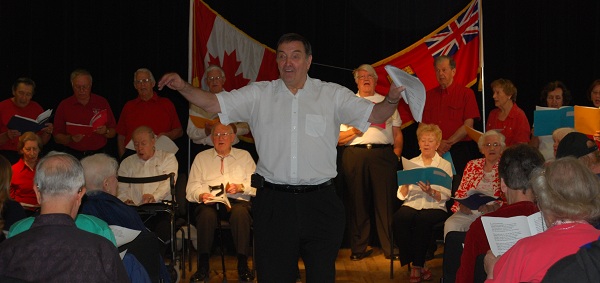Archive
Songs of wartime prompt floods of memories
June 19, 2013 · 0 Comments

By Brock Weir
Joy Gannicott was just a little girl growing up in Bristol, England during the Second World War.
When the Aurora pianist hears and plays the songs of the era, vivid memories of the trying time come flooding back.
As the Aurora pianist lent her talents to the voices of Aurora’s Senior Stars as they took over the Aurora Cultural Centre’s Brevik Hall for “We’ll Meet Again” – an afternoon of vintage and patriotic music – she was not alone.
“I was a young girl during the war in Bristol, but I also spent many nights in an Anderson shelter and we had many, many nights gathering together and singing to keep our spirits up,” she recalled. “I had one little blanket that I took with me when the air raids came and we were out in the shelters.
“It was actually quite a lot of fun. I don’t think we realised the danger of it, but these songs are what we did sing.”
The songs offered up to the packed crowd, she said, resonated with many of the people because they had lived it themselves. They are songs very “specific” to the period with a patriotism that might be more prevalent and relevant to different generations.
“And did those feet in ancient time?” she pondered of Jerusalem, a favourite with the audience. “Well, do we know? Probably not, but these songs are very connected with the English and everything they went through in the war. It was such a joyful sound today.”
For Royal Navy veteran Cliff Davies, singing acapella is a particular joy. One of the loudest and most enthusiastic members of the group bringing the venerable tunes to life, he said the songs also reminded him of those tentative days.
“The Anderson shelters were in most people’s gardens and 90 per cent of the people in the south of England had them,” he said. “It was a hole dug in the garden and then corrugated iron put in the shape and they got a double bed in there. Mum and Dad slept in the chairs and the kids slept in the bed. That is what these songs bring back to me. These are about freedom and why we carry the torch.”
These songs conjured up different sorts of memories for Dorothy Gummersall, an active volunteer in the Aurora Community. Growing up during the war with two elder brothers who had enlisted or were on the cusp of enlisting, she was 10 when the war ended. Known to her eldest brother as “Dot”, she almost caused an international incident when she sent him a letter in mock Morse code.
She remembers the air raids overseas and being instructed by soldiers going door to door to put blankets in their windows – cautioning that even the slightest sliver of light that got out from the window panes could be a signal to enemy aircraft above that people were living down below and would drop the bomb.
“That scared the life out of me,” she said.
No surprise there.
Inspired by the service of her siblings, she joined the Royal Canadian Navy as soon as she could, serving in various posts and on various ships during the Cold War, including stints on HMCS York and HMCS Esquimalt. Very proud of her service, Ms. Gummersall is a familiar fixture at local military and Remembrance Day services, proudly donning the vivid and dramatic caped uniform of a Royal Canadian Navy Medical Nurse.
Among her favourite songs of the era are The White Cliffs of Dover and We’ll Meet Again.
“I ended my career after three years, came home, and married the boy I left behind,” she said.
Near the end of the recital, some of the more rousing numbers were conducted by Brian Sperry, an active member of the Aurora Seniors’ Centre, Senior Stars, the Northern Lights Barbershop Quartet and, as he said, an all-round “general rabble-rouser.”
Mr. Sperry first became interested in music of the very early days of his youth and the music of his parents’ and grandparents’ generations about 40 years ago when he saw an American group tour England offering the lost art of Barbershop, and also the music that lead to its demise – the British Music Hall tradition.
“In the year I was born, a society was formed to preserve Barbershop and we sing only songs that are tuneful, and music that means something,” he said.
“Songs that have a message carry people back and it is amazing how many people here didn’t have to look at the words because they were embedded from their childhood.”













